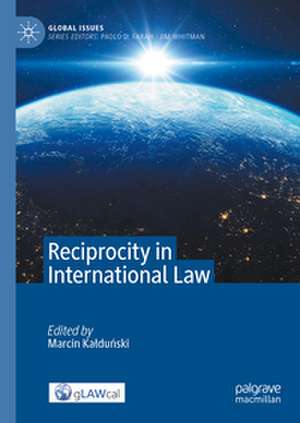Reciprocity in International Law: Global Issues
Editat de Marcin Kałduńskien Limba Engleză Hardback – 9 oct 2024
Din seria Global Issues
-
 Preț: 136.44 lei
Preț: 136.44 lei - 8%
 Preț: 158.20 lei
Preț: 158.20 lei - 9%
 Preț: 157.57 lei
Preț: 157.57 lei - 14%
 Preț: 143.78 lei
Preț: 143.78 lei - 14%
 Preț: 234.44 lei
Preț: 234.44 lei - 13%
 Preț: 235.44 lei
Preț: 235.44 lei - 15%
 Preț: 642.83 lei
Preț: 642.83 lei - 14%
 Preț: 234.17 lei
Preț: 234.17 lei - 14%
 Preț: 144.29 lei
Preț: 144.29 lei -
 Preț: 175.88 lei
Preț: 175.88 lei - 15%
 Preț: 647.92 lei
Preț: 647.92 lei - 15%
 Preț: 643.34 lei
Preț: 643.34 lei -
 Preț: 386.99 lei
Preț: 386.99 lei - 14%
 Preț: 111.38 lei
Preț: 111.38 lei - 15%
 Preț: 642.51 lei
Preț: 642.51 lei - 14%
 Preț: 145.90 lei
Preț: 145.90 lei -
 Preț: 392.21 lei
Preț: 392.21 lei - 15%
 Preț: 643.84 lei
Preț: 643.84 lei -
 Preț: 314.92 lei
Preț: 314.92 lei - 13%
 Preț: 235.18 lei
Preț: 235.18 lei - 15%
 Preț: 155.89 lei
Preț: 155.89 lei - 15%
 Preț: 640.71 lei
Preț: 640.71 lei -
 Preț: 355.62 lei
Preț: 355.62 lei - 15%
 Preț: 643.34 lei
Preț: 643.34 lei - 18%
 Preț: 782.44 lei
Preț: 782.44 lei -
 Preț: 354.77 lei
Preț: 354.77 lei -
 Preț: 383.71 lei
Preț: 383.71 lei - 9%
 Preț: 157.04 lei
Preț: 157.04 lei - 18%
 Preț: 1015.82 lei
Preț: 1015.82 lei - 15%
 Preț: 639.41 lei
Preț: 639.41 lei - 14%
 Preț: 124.37 lei
Preț: 124.37 lei - 13%
 Preț: 235.63 lei
Preț: 235.63 lei -
 Preț: 391.22 lei
Preț: 391.22 lei - 15%
 Preț: 644.18 lei
Preț: 644.18 lei - 13%
 Preț: 234.53 lei
Preț: 234.53 lei - 14%
 Preț: 158.64 lei
Preț: 158.64 lei - 15%
 Preț: 641.85 lei
Preț: 641.85 lei -
 Preț: 391.22 lei
Preț: 391.22 lei -
 Preț: 392.75 lei
Preț: 392.75 lei - 14%
 Preț: 144.39 lei
Preț: 144.39 lei - 15%
 Preț: 644.49 lei
Preț: 644.49 lei -
 Preț: 383.93 lei
Preț: 383.93 lei -
 Preț: 358.16 lei
Preț: 358.16 lei - 15%
 Preț: 142.89 lei
Preț: 142.89 lei - 15%
 Preț: 639.25 lei
Preț: 639.25 lei
Preț: 1117.69 lei
Preț vechi: 1363.04 lei
-18% Nou
Puncte Express: 1677
Preț estimativ în valută:
213.86€ • 223.90$ • 176.96£
213.86€ • 223.90$ • 176.96£
Carte tipărită la comandă
Livrare economică 07-21 aprilie
Preluare comenzi: 021 569.72.76
Specificații
ISBN-13: 9783031667459
ISBN-10: 303166745X
Pagini: 200
Ilustrații: Approx. 200 p.
Dimensiuni: 148 x 210 mm
Greutate: 0.7 kg
Ediția:2025
Editura: Springer Nature Switzerland
Colecția Palgrave Macmillan
Seria Global Issues
Locul publicării:Cham, Switzerland
ISBN-10: 303166745X
Pagini: 200
Ilustrații: Approx. 200 p.
Dimensiuni: 148 x 210 mm
Greutate: 0.7 kg
Ediția:2025
Editura: Springer Nature Switzerland
Colecția Palgrave Macmillan
Seria Global Issues
Locul publicării:Cham, Switzerland
Cuprins
Introduction.- Chapter I - The History and Idea of Reciprocity.- Chapter II – Reciprocity in International Relations.- Chapter III – Reciprocity and Customary International Law.- Chapter IV – Reciprocity and Treaty Law.- Chapter V – Reciprocity and Countermeasures.- Chapter VI – Reciprocity and the Use of Force.- Chapter VII – Reciprocity and Diplomatic and Consular Law.- Chapter VIII – Reciprocity and Human Rights.- Chapter IX – Reciprocity and International Humanitarian Law.- Chapter X – Reciprocity and International Environmental Law.- Chapter XI - Reciprocity and International Organizations Law.- Chapter XII – Reciprocity and Jurisdiction of International Courts and Tribunals.- Chapter XIII – Reciprocity in International Law: An Economic Analysis.- Chapter XIV – Reciprocity and WTO Law.- Chapter XV – Reciprocity and International Investment Law.- Chapter XVI – Reciprocity and Nuclear Weapons.- Conclusion – The Framework of Reciprocity in International Law.
Notă biografică
Marcin Kałduński is Professor of International Law at the Nicolaus Copernicus University (Toruń, Poland). He practices in the areas of dispute resolution and specializes in international commercial and investment arbitration, with a focus on disputes involving States and State-owned entities.
Textul de pe ultima copertă
The world is changing. The era of globalization – where the states have been eager to cooperate towards common aims – might seem to be disappearing. Russia expresses a contempt for international law, China makes claim to power, while the United States, at least temporarily, shows disregard to international institutions they themselves created (in particular, the WTO and the WHO). The growing phenomenon of nationalistic and authoritarian leaders may seem to hamper the development of community interests. Some states may be more inclined to resort to reciprocal behaviour as certain events indicate (e.g., the exchange of prisoners-of-war in the Russia-Ukraine conflict and an exchange of economic sanctions – tit-for-tat or tat-for-tat). The field of international law appears to be returning to first principles in the light of multiple world crises. Thus, reciprocity – as a classic concept of international law – may “come back from the shadows,” be reinvented and reinforced to form one of the basic pillars in the relations among states. Given the above, the purpose of the book is to rediscover and identify the position and role of reciprocity in contemporary international law.
Marcin Kałduński is Professor of International Law at the Nicolaus Copernicus University (Toruń, Poland). He practices in the areas of dispute resolution and specializes in international commercial and investment arbitration, with a focus on disputes involving States and State-owned entities.
Marcin Kałduński is Professor of International Law at the Nicolaus Copernicus University (Toruń, Poland). He practices in the areas of dispute resolution and specializes in international commercial and investment arbitration, with a focus on disputes involving States and State-owned entities.
Caracteristici
Identifies the position and role of reciprocity in contemporary international law Examines the creation, application and enforcement of international law Explores how reciprocity may look like in the future
